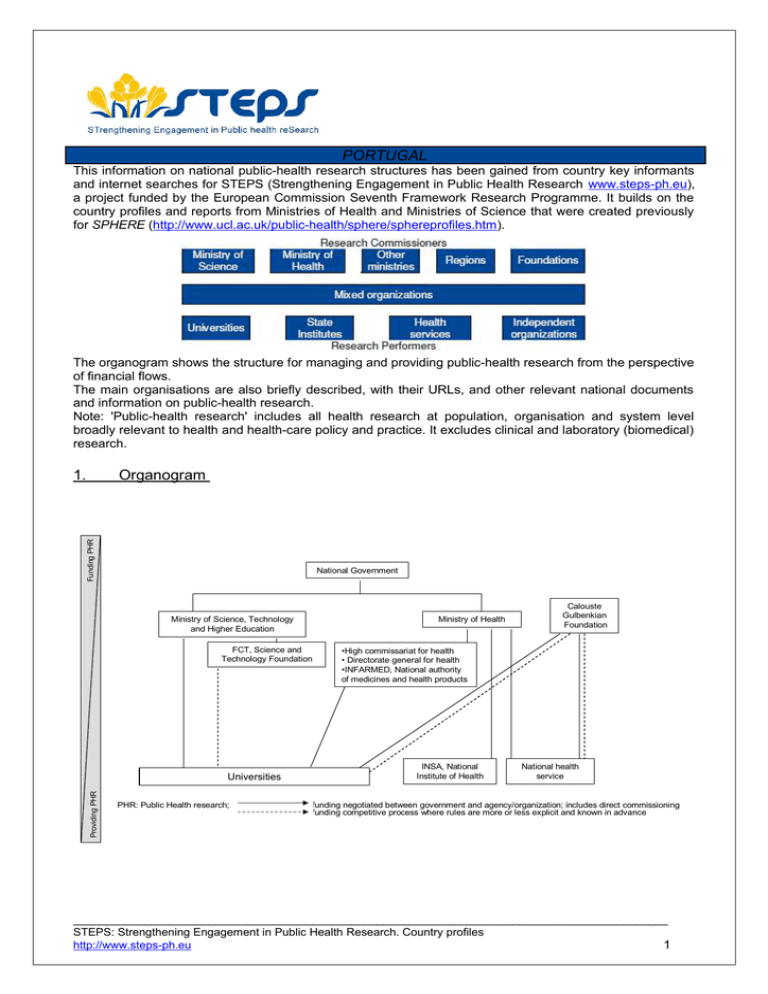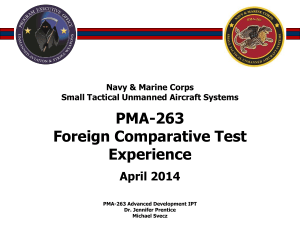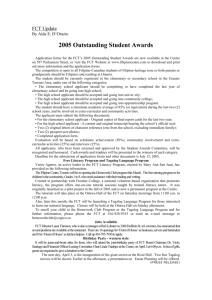PORTUGAL
advertisement

PORTUGAL This information on national public-health research structures has been gained from country key informants and internet searches for STEPS (Strengthening Engagement in Public Health Research www.steps-ph.eu), a project funded by the European Commission Seventh Framework Research Programme. It builds on the country profiles and reports from Ministries of Health and Ministries of Science that were created previously for SPHERE (http://www.ucl.ac.uk/public-health/sphere/sphereprofiles.htm). The organogram shows the structure for managing and providing public-health research from the perspective of financial flows. The main organisations are also briefly described, with their URLs, and other relevant national documents and information on public-health research. Note: 'Public-health research' includes all health research at population, organisation and system level broadly relevant to health and health-care policy and practice. It excludes clinical and laboratory (biomedical) research. Organogram Funding PHR 1. National Government Ministry of Science, Technology and Higher Education Ministry of Health FCT, Science and Technology Foundation Providing PHR Universities PHR: Public Health research; Calouste Gulbenkian Foundation •High commissariat for health • Directorate general for health •INFARMED, National authority of medicines and health products INSA, National Institute of Health National health service funding negotiated between government and agency/organization; includes direct commissioning funding competitive process where rules are more or less explicit and known in advance ____________________________________________________________________________________________ STEPS: Strengthening Engagement in Public Health Research. Country profiles http://www.steps-ph.eu 1 2. Research Commissioners 2.1 Ministry of Health, http://www.portaldasaude.pt/portal The High Commissariat for Health (Alto Comissariado da Saúde, http://www.acs.minsaude.pt/) has the responsibility of coordinating the Ministry of Health activities in the fields of strategic planning and international relations. The Directorate General for Health (Direcção Geral da Saúde, http://www.dgs.pt/) has the mission of regulation and coordination of the Ministry of Health activities in the field of health promotion, disease prevention and definition of technical treatment guidelines. The INFARMED, National authority of medicines and health products, (http://www.infarmed.pt) is a Ministry of Health agency and includes in its mission to promote and support, in conjunction with universities and other research and development institutions, study and research in pharmaceutical science and technology, biotechnology, pharmacology, pharmacoeconomics and pharmacoepidemiology. These three institutions fund research through the commissioning of studies. 2.2. Ministry of Science Ministry of Science, Technology and Higher Education, http://www.mctes.pt/ 2.2.1.The FCT, Science and Technology Foundation (http://alfa.fct.mctes.pt/fct.phtml.en) is an agency under the Ministry of Science, Technology and Higher Education. The mission of FCT consists in continuously promoting the advancement of scientific and technological knowledge in Portugal, exploring opportunities that become available in any scientific or technological domain to attain the highest international standards in the creation of knowledge, and to stimulate their diffusion and contribution to improve education, health, environment, and the quality of life and well being of the general public. This mission is mainly accomplished through the funding, subsequent to the evaluation of the merit, of proposals presented by institutions, research teams or individuals in public open calls, and also through cooperation agreements and other forms of support in partnership with universities and other public or private institutions, in Portugal and abroad. FCT includes the following scientific boards: Scientific Council for Life and Health Sciences; Scientific Council for Exact Sciences and Engineering; Scientific Council for Natural and Environmental Sciences; Scientific Council for Social Sciences and the Humanities. 2.3. Other ministries 2.4. Regions 2.5. Foundations 2.5.1. The Calouste Gulbenkian Foundation is a Portuguese private non-for profit institution of public utility whose statutory aims are in the fields of arts, education, welfare and science. The Foundation organises international conferences, meetings and courses, awards subsidies and scholarships for specialist studies and doctorates in Portugal and abroad, and supports programmes and projects of a scientific, educational and artistic nature. (Source: http://www.gulbenkian.pt/index.php?section=9&langId=2, assessed in March 2010) 3. Research Performers 3.1. State Institutes ____________________________________________________________________________________________ STEPS: Strengthening Engagement in Public Health Research. Country profiles http://www.steps-ph.eu 2 3.1.1. The INSA, National Institute of Health Doutor Ricardo Jorge develops its activity as the State Laboratory of the health sector, national reference laboratory and national health observatory, with the mission of contributing to health gains, either on the laboratory dimension or through specialized health care. INSA ensures its mission through research and technological development; epidemiological and health services research; external quality assurance for laboratories; diffusion of scientific culture; fostering capacities, knowledge and skills and by providing specialized services, including the prevention of genetic diseases. INSA has the following departments: food and nutrition, infectious diseases, epidemiology, genetics, health promotion and chronic diseases, and environmental health. (Source: http://www.insa.pt/sites/INSA/English/Pages/NationalHealthInstituteDoutorRicardoJorge.aspx, assessed in March 2010) 3.2. Mixed organizations 3.3. Universities Higher Education includes universities (15) and polytechnic education (approximately 20 institutes). 3.3.1. The National School of Public Health (http://www.ensp.unl.pt) is a public establishment for Public Health, Health Services Administration and Health Economics teaching and research. It is part of the New University of Lisbon (UNL – Universidade Nova de Lisboa, http://www.unl.pt/universidade/university). The IHMT, Institute of Tropical Medicine (Instituto de Higiene e Medicina Tropical, www.ihmt.unl.pt) is also part of the New University of Lisbon and includes in its areas of education, research and cooperation the fields of public health and international health. The ISPUP, Institute of Public Health (Instituto de Saúde Pública da Universidade do Porto, http://www.ispup.up.pt/index.php?lang=en) is a training and research institution in The Oporto University. It comprises Units in areas such as: Epidemiology and Biostatistics, Geotechnologies, Woman and Child Health, Occupational and Environmental Health, International Health, Clinical Governance, Health Anthropology, Mental Health and Nutrition. 3.3.2. Other Research and development units The FCT, Science and Technology Foundation, provides the basic funding for the R&D units for periods as long as five years, and organises their regular evaluation. FCT supports 320 R&D units and 25 Associate Laboratories. The eligible units, to this MultiYear Funding Program must be integrated into or associated with institutions of higher education, when these function as host institutions or be private not-for-profit institutions specially dedicated to R&D activities, or which have units with these characteristics. From the list of evaluated units (process started in 2007 and last results published in June 2009) some more research providers can be identified in the scientific areas of Health Sciences, Social Sciences (Economics and managements; sociology, anthropology, Demography and Geography) and Arts and humanities (Psychology): CEDOC (Centre for Studies in chronic diseases with a research group in epidemiology, health policy and services in the Faculty of health sciences, Nova University of Lisbon); CEISUC (Centre for Studies and research in health of Coimbra University with a research group in health systems performance); CICTS (Centre for research in health sciences and technologies with a research group in health care practices to old people, in Évora University); CIFI2D (Centre for research, training, intervention and invocation in sport, with research areas related with sports practice and dropout, lifestyles and wellbeing in the Faculty of sciences of sport and physical education of Oporto University); IMP (Institute of Preventive Medicine with a ____________________________________________________________________________________________ STEPS: Strengthening Engagement in Public Health Research. Country profiles http://www.steps-ph.eu 3 research group on health determinants in the Faculty of medicine of Lisbon University); UIDC (Unit of cardiovascular research with a research group on Clinical Epidemiology and Public Health in the Faculty of medicine of Oporto University); UICOB (Biomedical and oral sciences research unit with a research group on epidemiology studies in the Faculty of Dental Medicine in Lisbon University); CICS (Centre for research in social sciences with a research group on Politics, development and social inequalities in the Minho University); cesNova (Centre of studies in sociology of the Nova University of Lisbon with a research group on public policies and social responsibility and another in population dynamics); CIIS (Centre for research and social intervention with a research group on Quality of Social Life: Health, Environment and the Community in the ISCTE, a public University Institute); CIPD (Centre for research in psychology and development with a research group on behaviour and health in a private university, Lusíada University). 3.4. Health Services 3.5. Independent organizations 4. Research Strategies 5. Programmes and calls 5.1. The FCT, Science and Technology Foundation has held Calls for Projects in all scientific domains every 2 years since 2000 and every year since 2008, in addition to calls targeting specific scientific areas. (Source: http://alfa.fct.mctes.pt/fct.phtml.en, assessed in March 2010) 5.2. Ministry of health opens, on a non regular basis, calls for support of research developed by National Health Service professionals. 6. European contacts 6.1.National FP7Contact point (Health Theme)1 6.1.1. Maria João Fernandes (Instituto de Biologia Experimental e Tecnológica) 6.1.2. Joana Camilo (Ministry of Science, Technology and Higher Education, GPPQ - FP7 Promotion Office), http://www.gppq.mctes.pt 6.2. National DGSANCO Contact point2 6.2.1. Belmira Rodrigues, General Directorate of Health, belmirar@dgs.pt 1 2 Source: http://cordis.europa.eu/fp7/ncp_en.html, assessed in February 2010 Source: http://ec.europa.eu/health/programme/policy/index_en.htm assessed in February 2010 ____________________________________________________________________________________________ STEPS: Strengthening Engagement in Public Health Research. Country profiles http://www.steps-ph.eu 4






